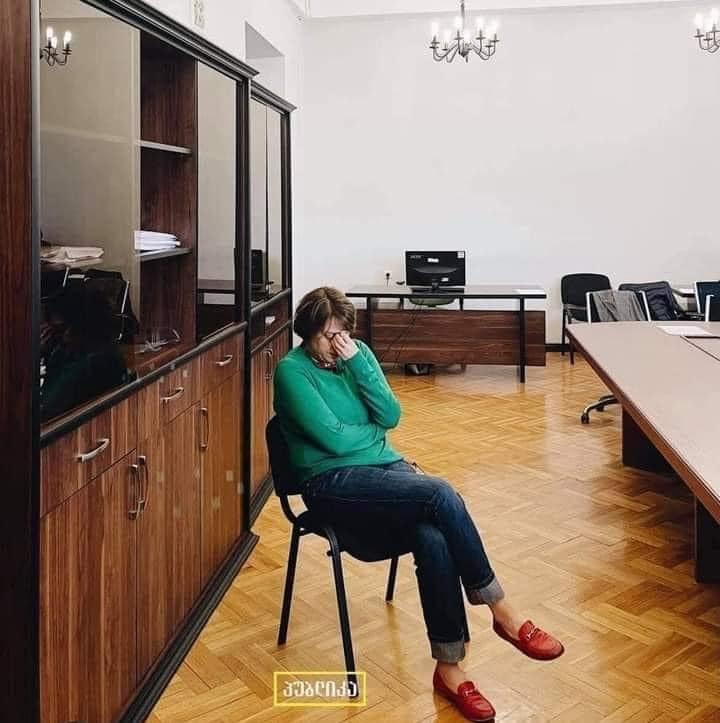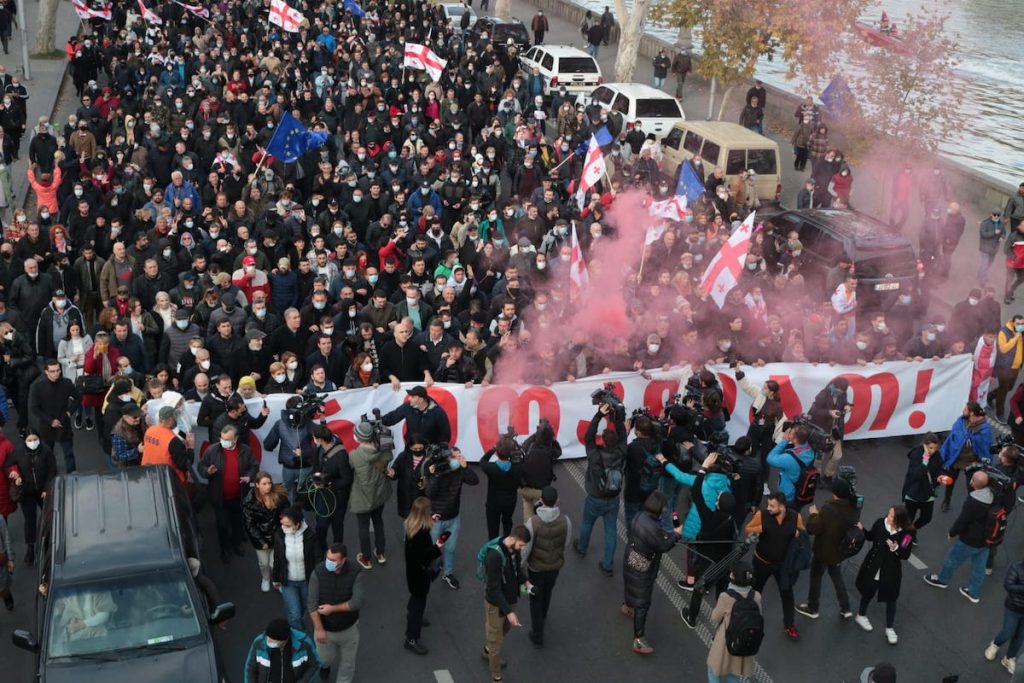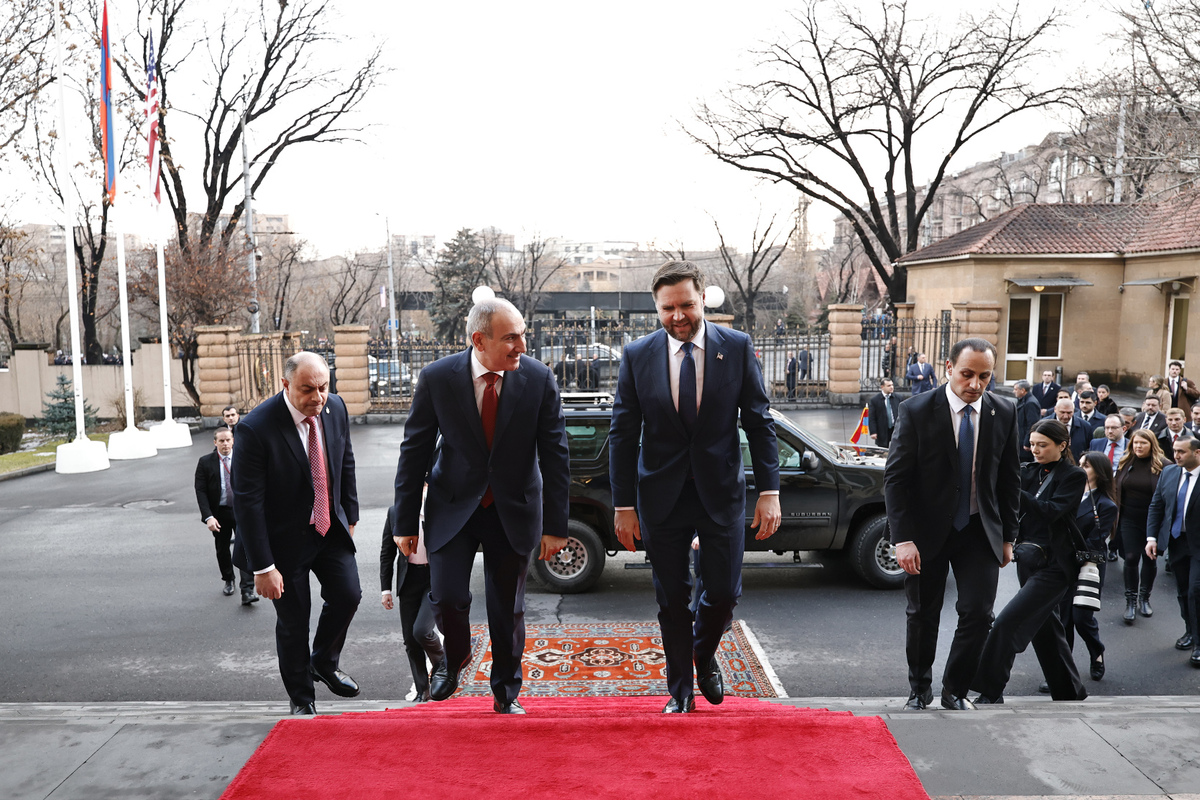Ukrainian Ombudswoman denied visit to Saakashvili as his hunger strike hits 47th day
Former Georgian President Mikhail Saakashvili has been on hunger strike for 47 days. Eight days have passed since his transfer from Rustavi prison to a medical facility in Gldani prison. Saakashvili has not taken nutritional supplements for 10 days and, according to his friends and lawyers, refuses to undergo some medical procedures.
Saakashvili said that he would end his hunger strike if he was transferred to a multidisciplinary civilian clinic. However, doctors say that if he stops starving, he will still need to be taken to a multidisciplinary clinic, because after almost two months of fasting, starting to eat again is not a medically easy process and can be life-threatening if the starving person does not receive adequate medical attention and is not placed under constant surveillance.
- What is Georgia’s ex-president tried for?
- Is Saakashvili a political prisoner? Lawyers and human rights defenders’ explain.
Public Defender of Ukraine Lyudmila Denisova was denied a visit to the prison hospital where Saakashvili is currently located. The meeting was requested by Saakashvili himself, who holds a status of a citizen of Ukraine.
According to Denisova, she still has not received an official explanation for the refusal from the Penitentiary Service. The Minister of Justice of Georgia, Rati Bregadze, said that “the legislation of Georgia does not provide for a visit to the prison by the Public Defender of Ukraine and there is no need for this, we are not obliged to do this”.
The minister also confirmed in a November 16 briefing that the government has no plans to send Saakashvili to a civilian hospital:
“The state cares about the health of all people, and especially about the health and life of prisoners, it is one of the main principles for us”, he said.
One of the last to visit Saakashvili was Tina Bokuchava, a member of the United National Movement Party, who saw him on the evening of November 15. Bokuchava said that the ex-president was pale, weak and shaking (his hands were shaking).
On the same evening, a handwritten letter from Saakashvili was posted on his official Facebook account, in which he thanked the protesters and said that he had “not gotten out of bed for three days”.
For more than ten days, Mikheil Saakashvili did not see the members of the medical council created to monitor his health.
On November 14, members of the council were not allowed to see Saakashvili after a two-hour wait. The reason given by the Penitentiary Service was non-working hours.
However, the protocol, prepared by the council during Saakashvili’s stay at the 12th correctional facility in Rustavi, states: “The patient is at high risk of multisystem complications. Urgent treatment is required in a multidisciplinary high-tech medical institution, where it will be possible to carry out the appropriate cardiovascular, neurological, therapeutic and diagnostic radiological (MRI. Catheterization laboratory), hematological, endocrine, diet therapy”.
The Gldan prison hospital, where Saakashvili was placed, is not equipped with such amenities and is unsafe for the ex-president, according to the ombudsman’s office, whose representatives have repeatedly studied the situation on the spot.
In addition to doctors, European lawmakers, including MEP, former Polish Foreign Minister Anna Fotyga, were not allowed to visit Saakashvili in the Gldani prison hospital.
Yesterday, November 15, after a six-hour wait, Saakashvili’s personal doctor Nikoloz Kipshidze was not allowed into the prison hospital.
For 14 days, the leader of the Droa political movement, Elene Khoshtaria, has been on hunger strike in the parliament building, demanding that Saakashvili be transferred to a civilian multidisciplinary clinic. An ambulance was called for her several times. According to her, threatening changes appeared in the analyzes, requiring urgent transfusions due to the risk of kidney failure.

On November 14, ten more opposition MPs and politicians went on a hunger strike with the same demand. On November 15, several more people joined the hunger strike. Among them are members of the Zugdidi City Council (Sakrebulo).
The transfer of Saakashvili to a multidisciplinary civil clinic has been the main demand of the opposition, representatives of civil society and his family for more than two weeks.
Regular Facebook users, as well as prominent members of the public, are asking the authorities to transfer the former president to a clinic with the hashtag #Transfer.
This is also the main demand of the opposition for permanent protests. For almost two weeks now, mass rallies in Tbilisi have become commonplace. On November 15, protesters blocked traffic on both city embankments, and on November 16, the opposition announced a new protest in convoys.

On November 15, the son of the former president, Eduard Saakashvili, released a video message demanding that Mikhail Saakashvili be transferred to a multidisciplinary clinic. “The government can, with a few simple steps, solve the existing problem and eliminate the threats to my father’s health. I hope that no one wants his death, so on my behalf, as well as my brother and our mother, I ask you to take Mikhail Saakashvili to a civilian clinic”, he said.
Very little is known about Saakashvili’s health. Information on this topic is being disseminated by the ex-president’s personal doctor Nikoloz Kipshidze, several of his teammates, as well as lawyers.
According to them, the former president is much weaker in recent days, rarely gets out of bed, and occasionally experiences vomiting, dizziness and trembling limbs. He speaks slowly.
Eka Kherkheulidze, a member of the United National Movement and a friend of Saakashvili, says that the ex-president “is not even in a prison hospital, but in a converted ward of an outpatient clinic”.
“He was placed in a separate ward specially converted for him. There is one person at his cell, one doctor is constantly on duty in the next room, and if he does not call him himself, he will not know that he has become ill … There is nothing in there but a pressure measuring device … Mikhail Sakaashvili is not in a multidisciplinary clinic, but in a multidisciplinary hell”, Kherkheulidze said on the air of the Pirveli TV channel.
According to her, the former president cannot even breathe air:
“The window is completely closed. Sunlight does not penetrate the room. As soon as Saakashvili opens this window, the abuse and hysteria of the prisoners are immediately heard, and he is forced to close the window. He has no way of getting oxygen. Right in front of his window there is a building with prisoners who carry out the task”, said Kherkheulidze.
The prison administration categorically denies this information and states that there is an intensive care unit next to Saakashvili’s cell.
The penitentiary system calls the information about the deterioration of Saakashvili’s condition “a lie”.
The head physician of the Gldan prison hospital, Manana Elefterova, said that nothing threatens the life of the ex-president and that the information about the extremely serious state of health of Mikhail Saakashvili does not correspond to reality.
Mamuka Mdinaradze, executive secretary of the ruling Georgian Dream party, told reporters after a parliamentary majority meeting that the government sees no need to send Saakashvili to a multidisciplinary civilian hospital and is not going to do so:
“A number of employees and a number of specific doctors, including doctors from various teams, take care of Saakashvili’s health, so if any medical services are required, they will be provided”, he said.
According to him, Saakashvili no longer needs the help of a council, because this group was formed when Mikhail Saakashvili was in Rustavi prison, and now he is in the prison hospital under the supervision of local doctors:
“We hear calls to take him to a multifunctional clinic, but he is already in a multifunctional clinic”, Mdinaradze said.
-
Criminal cases against Mikhail Saakashvili
Mikhail Saakashvili was detained on October 1. Four criminal cases have been launched against him in Georgia.
He was convicted in two cases (the beating of Valery Gelashvili and the case of the murder of Sandro Girgvliani) and sentenced to 6 years in prison. The court is considering two more cases against Saakashvili.
Case # 1 – The case of the beating of Valery Gelashvili – Mikheil Saakashvili was accused of organizing a group attack on MP Gelashvili. Gelashvili was attacked in 2005. The attack was preceded by an interview with Gelashvili to the newspaper Rezonansi, in which he spoke offensively about Saakashvili and his wife. The investigation claims that Gelashvili was beaten upon Saakashvili’s request.
Case # 2 – The case of the murder of Sandro Girgvliani is one of the most notorious cases in the modern history of Georgia. The ex-president was not accused of murdering Girgvliani, but of pardoning the murderers of Girgvliani by prior conspiracy. For this he was sentenced to three years in prison. Saakashvili pardoned Girgvliani’s killers in 2008, cutting their sentences in half.
Case 3 – November 7 – The ex-president is accused of dispersing participants in anti-government protests in November 2007, as well as an attack on the Imedi TV channel. According to the prosecutor’s office, in connection with the events of that period, the TV channel suffered damage in the amount of GEL 3,158,307. The punishment for these crimes is imprisonment for a term of 5 to 8 years.
Case # 4 – embezzlement of state property, the so-called Jacket Case is a case of misappropriation of more than 9 million lari (over $ 3 million) for personal needs (spending on luxury hotels and sanatoriums, visits to beauty clinics and clothing, including the purchase of seven jackets in the UK). The punishment for this crime is imprisonment for a term of 7 – 11 years.
These four cases against Mikheil Saakashvili were launched after the change of power in 2014. He has been convicted in the first two cases since 2018 and sentenced in absentia.
After his arrival to Georgia at the end of September 2021 and the subsequent arrest, the prosecutor’s office opened another case against Mikhail Saakashvili.
Case # 5 – Illegal Border Crossing Case – On October 1, 2021, the General Prosecutor’s Office announced that the Ministry of Internal Affairs is also investigating the illegal border crossing, which provides for a maximum sentence of 5 years in prison.
Chronology of events
On November 6, the Penitentiary Service released footage from the prison doctor’s office, in which the former president took a spoonful of food provided by the doctors.
The release of the video was preceded by a statement by the Public Defender confirming Saakashvili’s ongoing hunger strike. The ombudsman said Saakashvili began taking nutritional supplements on October 30 after the head of the prison’s medical department assured him that small doses in liquid form were necessary due to his health condition.
On the same day, November 6, in response to the published message, Mikheil Saakashvili said that he also refused to take food supplements.
On the evening of November 8, against his will, Saakashvili was transferred from the Rustavi prison to the medical center No. 18 of the Gldani prison. The penitentiary service released footage of his transfer – which shows how the ex-president, naked to the waist, is being dragged into the ward. The content of the material and its publication was criticized the Ombudsman of Georgia. The Ombudsman of Ukraine Lyudmila Denisova also reacted to the footage and noted that the video captured the torture and ill-treatment of the prisoner.
On November 10, the Tbilisi City Court launched a trial against Mikhail Saakashvili in the November 7 case. The ex-president, despite his desire and readiness, was not brought to trial.
On the evening of November 10, the European Court of Human Rights released “interim measures” in relation to Mikheil Saakashvili’s hunger strike, his health and safety. The European Court of Justice called on Mikheil Saakashvili to end the hunger strike and ordered the authorities to provide the detainee with proper treatment and safety.
On November 11, after a statement from Strasbourg, Saakashvili announced that he would end his hunger strike if he was taken to a civilian hospital.
On November 12, MEPs, including the former Polish Foreign Minister Anna Fotyga, were not allowed to visit Mikhail Saakashvili in the prison hospital.
On November 12, Eka Kherkheulidze, a member of the United National Movement, visited Saakashvili in the prison hospital. According to her, during the 4.5-hour visit, the former president of Georgia felt bad twice.
On November 13, Mikheil Saakashvili’s personal physician Nikoloz Kipshidze said that for the first time during the hunger strike Mikheil Saakashvili was unable to visit the waiting room, so Kipshidze saw him in Saakashvili’s room. According to Kipshidze, he spent about four hours in Saakashvili’s room, of which Saakashvili only got up once, and the rest of the time he was weak.
On November 14, Doctor Nikoloz Kipshidze visited Saakashvili again. He said that the ex-president looked weak, but he was able to come to the meeting himself. “Today, unlike yesterday, he was able to go down from the fifth floor by elevator. I met him in the waiting room. Yesterday he didn’t have that opportunity. He looks weak, but I repeat once again, he is ready for tomorrow’s hearing in court”, said Nikoloz Kipshidze.
On November 15, the Penitentiary Service refused to bring Mikheil Saakashvili to court for the second time. On November 15, the court considered the so-called Case of Jackets.




















